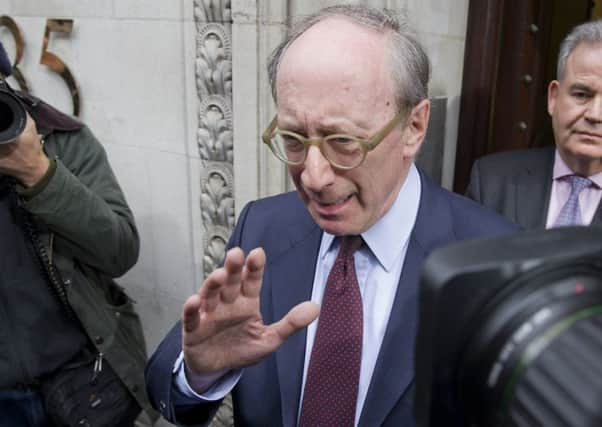Britain's place at top table at risk, warns Rifkind


Sir Malcolm Rifkind, who served as foreign secretary in John Major’s government, has also warned that the surge in support for another referendum raises fresh questions about the prospect of an independent Scotland being frozen out of the Nato defence alliance, which is currently meeting in Poland.
Two former Labour foreign ministers also fear that the UK’s international clout will be undermined as other nations now see the country as being associated with elements which “want to pull Europe apart and foster intolerance”.
Advertisement
Hide AdAdvertisement
Hide AdDavid Cameron is seeking to re-affirm Britain’s global standing after the decision to leave the EU as he meets with other Nato leaders in Warsaw this weekend.
He said: “Britain will not be playing a lesser role in the world.”
But MPs on the Joint Committee on the National Security Strategy (NSS) have warned in a report today that Britain’s armed forces may struggle in future to fulfil their role effectively because of defence budget cuts after Brexit.
Rifkind, who served as foreign secretary and defence secretary throughout the 1990s, said: “The decision that was taken by the electorate, and of course which has been accepted by the government, will have an impact for the time being, but a serious impact on Britain’s credibility as a serious global power.”
The United Kingdom retains its place on the UN security council and Nato, while the economy and military are strong globally, he added.
“However, part of our influence was as a senior figure round the table when the EU was dealing with foreign policy or international relations. That’s why contrary to the Brexiteers aspirations, people like President Obama, the prime ministers of Australia, Canada and New Zealand said we actually all want you inside not outside.
“So it has had an impact, no question about that, on your short to medium term credibility.
“If there is a fragmentation of the EU, it certainly isn’t easier, it’s much more difficult to maintain EU solidarity,” he added.
Advertisement
Hide AdAdvertisement
Hide AdThe SNP says an independent Scotland would remain in Nato but wants the UK’s Trident nuclear deterrent to be moved from Faslane.
“It would be a pretty unconvincing start to say our main contribution in the immediate future will be to expel one of two European deterrents from our shores,” Rifkind said.
Douglas Alexander, who served as Europe minister and shadow foreign secretary, said the EU played a pivotal role in securing peace in the Balkans, and the rise of Isis demands international co-operation.
“The EU without the UK would be smaller, poorer, and less influential on the global stage,” Alexander said.
Britain was a leading voice in securing EU economic sanctions against Russia following the annexation of Ukraine.
“Vladimir Putin has long sought to divide Europe in his own interests and a weakening of the EU will be welcomed by Kremlin strategists keen to advance their own idea of a Eurasian Union,” he said.
“This referendum result will encourage the rise of xenophobic, populist and nationalist forces across Europe who oppose the idea of co-operation and solidarity and thrive on division and grievance.”
Alexander led the British delegation to the 2008 World Trade Organisation (WTO) talks in Geneva and said the experience showed that “scale matters”.
Advertisement
Hide AdAdvertisement
Hide AdHe added: “Shrinking your home market while diminishing your leverage in international trade negotiations just doesn’t make sense.”
Brian Wilson, who served as foreign office and trade minister, fears that UK inward investment will suffer as global firms are no longer securing access to the lucrative EU single market.
“There will be no big announcements, just decisions quietly taken that it is better to go somewhere else, within the EU,” he said.
“Instead of being seen as a bastion of stability and liberal values, Britain is in danger of being associated with elements who want to pull Europe apart and foster intolerance.
“That is not a good place to be when it comes to our status in international organisations and negotiations.
“It is a fiction to claim that we will have more influence outside the EU than we did as an extremely influential member of it and that will soon become very apparent.”
William Walker, emeritus professor of international relations at St Andrews University also warned that Nato could be damaged as the EU often operates as a “security arrangement”, pointing to its role in resolving the nuclear impasse with Iran.
He added: “With Nato, these two organisations strengthened each other, they enforced each other, so the idea being promulgated by the Brexit people that it will have no effect on Nato is incorrect. It will affect Nato.”